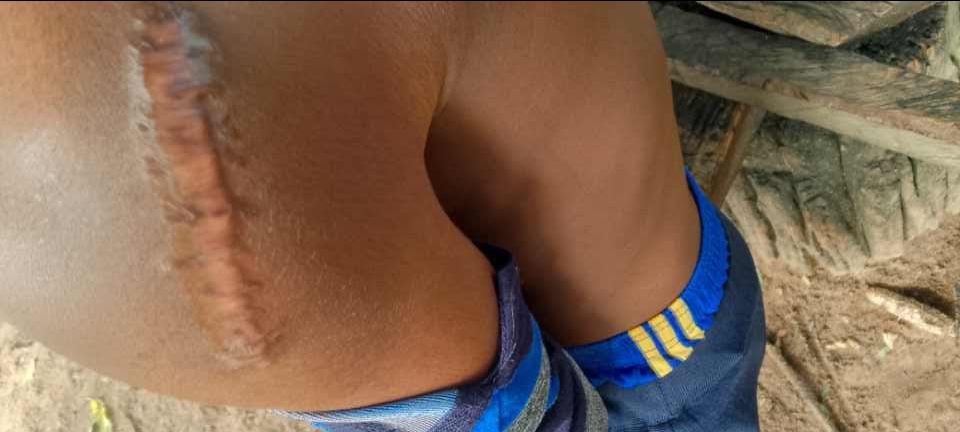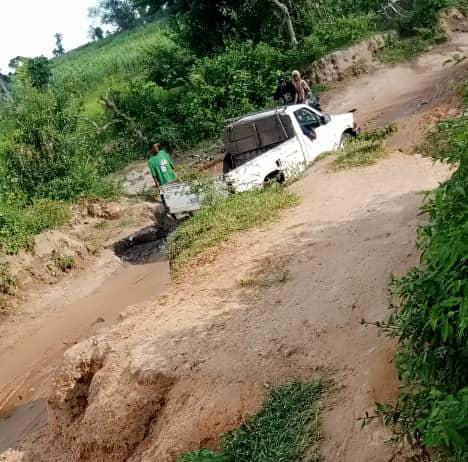As the nation embarks on a transformative journey, the removal of fuel subsidy has yielded a silver lining – increased allocations to states. Nasarawa State is one beneficiary whose allocation from the Federation Account Allocation Committee (FAAC) has more than doubled. However, communities along Ajaga road are still waiting for the trickle-down effect, as deplorable roads have stifled economic growth and fueled criminality Lawal Mamman reports.
Nasarawa
Nasarawa State is famously known as the ‘Home of Solid Minerals’, yet it also boasts significant agricultural potential. Ajaga, a community in Nasarawa Local Government Area, is one such example that could be leveraged to bolster the state’s revenue base and enhance its internally generated revenue (IGR). Despite this, the community has been left all alone.
Even with its vast fertile land and a blooming market, traders find it difficult to summon the courage to visit for business or farming, leaving the community in isolation with only a few courageous persons visiting the once-lively Ajaga market. This reality is a result of the deplorable state of 50km road leading to the community and its environs, and failed promises from political office holders who make promise without leaving up to them.
A narrow, rocky passage flanked by thick bush is what greets every visitor to this vibrant community. It becomes daunting when you encounter rickety wooden structures set up by locals in the form of a bridge for access to their homes. The road capable of causing vehicles to become stuck, which can take hours to retrieve, those living nearby have learned to live happily despite the luxuries they do not enjoy.
“The road is so terrible. There are people who have vowed that even if they are given N2 million, they will never come to Ajaga for any form of business transaction. We have received so many empty promises from politicians, but nothing has been done,” Hajara Abdullahi Lokko, a former women leader in the Lokko community, poured her heart out to DAILY NIGERIAN in a lamentable tone.
No Investment, No Entrepreneurs, Low Market Turn out
Road has been an important means of transportation for not just humans but goods and services also. According to the World Economic Forum (WEF) roads are the arteries through which the economy pulses, but that is a luxury that people in and around Ajaga are not fortunate enough enjoy, despite data showing that Nasarawa State, along with 10 others, has experienced the biggest average growth in allocations shared by the Federal Account Allocation Committee (FAAC) since 2023, with an increase of 185.3%.
Etende Musa Mustapha, a prominent farmer who grows melon, groundnut, yam, sesame, and sorghum, had this to say: “Very, very bad, especially during the rainy seasons, with a lot of potholes and gutters at this time, giving armed robbers and other unwanted elements the opportunity to steal properties that do not inherently belong to them.
“The farmers in the community also face significant challenges; nobody is willing to bring their vehicles for the transportation of farm produce to other parts of the state or country. How then can we expect to grow economically? Our market, which used to be very lively, is now experiencing a low turnout.
“The market used to operate for three days, from Friday to Sunday, but now we barely have a day. Whenever resilient individuals come to buy farm produce or sell other commodities, the market disperses before 3 pm. This is also largely due to the extreme neglect of the road, which takes 4-5 hours to commute from Nasarawa town, instead of the supposed 30-40 minutes. People cannot spend five hours on the road just to come and sell for three hours or so. You cannot make any serious form of investment here. How can we expect to contribute significantly to revenue growth in our state?”
Sadiya Musa, a community member and mass communication student, hopes to become a voice for her community and other underserved groups. She said: “Clearly, economic activities cannot thrive here. The state of affairs discourages interest and stifles any potential economic growth, no expert economist needed to see that.”
“The state of the road is nothing to write home about. Vehicles transporting goods often fall due to its poor condition, damaging goods and resulting in losses for entrepreneurs. This is a worrying situation, as I can assure you that, aside from Mararaba, there is no place that produces agricultural products in as large quantities as we do,” Safiyan Abdullahi who thinks more attention should be given to his community due to vast economic potential decried.
Daylight Robbery, Attacks and Costly Treatment
Idle hands are often said to be the devil’s workshop. The rising macroeconomic problems of unemployment, inflation, poverty have been identified as some of the leading causes of the increasing crime rate in the country. This age-old adage is manifest in Ajaga, where individuals striving to make ends meet are preyed upon by kidnappers and bandits. These criminals exploit the road’s deplorable condition to wreak havoc, targeting unsuspecting passersby and making off with their valuables. They leave their victims with grievous injuries, which come at a hefty cost to treat at distant medical centres.

Kabir Eshimutu, who had the misfortune of experiencing the treacherous road and the depravity of its users, recounted his ordeal, “I was attacked on my way home from the farm. Upon discovering I had no valuables on me, they slashed me with a cutlass and left me for dead. Some kind strangers, whom I did not know, took me to Gawayi Hospital. The treatment cost me a staggering N700,000.”
Yohana Neraba recounted his experience, “I was on my way to the market when they attacked me, if the road were to be smooth, escaping them would have been easy for me. Initially, I was reluctant to comply, but eventually, I lay flat on my stomach as instructed. They took what they wanted and inflicted several injuries on me. Even after spending N671,000 on treatment, I still experience pain to this day, a year later. I must admit that such attacks have decreased significantly; whereas previously, we would have three to four attacks per day, nowadays, some days pass without any incidents. Nevertheless, constructing the road remains crucial to prevent a recurrence of these attacks.’
They operate with near impunity during the day, making the night no different. Adam Danjuma recounted his terrifying experience: “As night fell, unknown men stopped my bike while I was attempting to navigate the treacherous road. My case was unusual, as they did not demand a penny; instead, they produced a machete and made a direct attack on my head. Fortunately, I instinctively used my hand to cover my head, and was lucky to escape unharmed on the head but with serious injury on the hand. God had ordained that those were not my final days. My advice to the government is to take prompt action to repair the road; otherwise, these individuals will inevitably cause greater harm in the future.”
A Cry for Help and Conviction to Keep Asking
Given the state of the road, community members have requested that those in authority take swift action, while remaining resolute in their efforts to continually remind them of their plight. They argue that this has become necessary to boost the economy, enhance security through prompt responses to distress calls, and prevent avoidable deaths often resulting from prolonged transportation and sorry-state of the road.
“The criminal elements are aware that it will take an inordinate amount of time for security operatives to arrive due to poor road network, so, they operate at will, knowing that no one can stop them. To the best of my knowledge, no government has made any effort to repair this road, despite the area being home to fertile land and vast agricultural potential. It is time they look in our direction for the betterment of Nasarawa State,” Safiyan opined.

For Mustapha, the road is not the sole reason people are deterred from investing in Ajaga and surrounding communities. “Compounding this issue is that people are also discouraged from settling in the community due to the lack of social amenities like hospital among other things. I personally experienced a tragic loss due to this situation. My cousin was severely attacked, and unfortunately, there were no medical facilities nearby. We had to transport him to Nasarawa town, but due to the unnecessary distance, he died before we arrived,” he emphasised.
According to Sadiya, “The truth is that we have numerous politicians from this region who have the capacity to effect change. They possess the power and resources to transform our communities, yet they fail to do so. We only see them making promises during election campaigns, offering women Maggi and other token gestures, a pattern that repeats itself every election cycle.
“As youths, we have made several attempts to bring our plight to the attention of higher authorities, including writing multiple letters to the local government chairman, but to no avail. After these efforts, we have been left wondering whether our message is even reaching the right authorities. At one point, various associations, including the Ajaga Youth Association, Mechanic Association, and Bagi Association, among others, organised themselves and paid a visit to the local government chairman, but the situation remains unchanged. All we can do is continue to push for change”
Community Leader, Government React
The traditional leader of the community, Adakogba (king) Afo Etende Musa Dankana, acknowledged the sorry state of the 50km road, but believes the government is in the dark about its true condition. If they had a clearer picture, things would have taken a turn for the better. However, he is hopeful that with President Bola Ahmed Tinubu’s administration, which is bent on rural development, the tide will turn in their favour.
“For the past 25 years, the community has faced acute shortage of road network leading to untold hardship and ugly situations for areas especially between Ajaga-Tunga Bakono. The community which is a commercial centre and major food producing area in Nasarawa State now has scanty market due to banditry, armed robbery and kidnapping all due to the dreadful road network.
“To the best of my knowledge, the government has never approved contracts for the construction of this road but we collectively believe that it is not adequately informed of our ugly situation otherwise, it would have been a thing of the past. On behalf of thousands, I solicit government in tears to immediately come to our aid as road networks are essential daily for economic growth. That being said, I remain positive that with Tinubu’s administration it will get better because he is committed to rural development”
When the local government chairman, Mahammad Sani Otto, was contacted to respond to the findings of this report, he requested that, instead of a phone conversation, a letter be sent to his office. At the time of filing this report, no response had been received.






